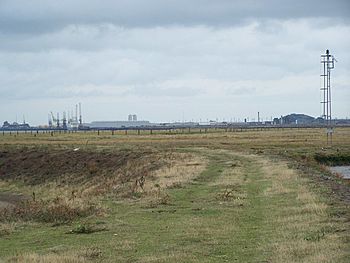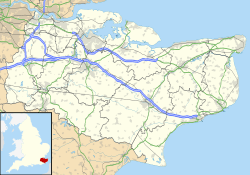Deadman's Island (Kent) facts for kids

looking across Deadman's Island to the works on the Isle of Grain
|
|
| Geography | |
|---|---|
| Location | River Medway estuary |
| Coordinates | 51°25′16″N 0°43′20″E / 51.4212°N 0.7223°E |
| Length | 1.2 km (0.75 mi) |
| Width | 0.2 km (0.12 mi) |
| Administration | |
|
England
|
|
| County | Kent |
| Borough | Swale |
| Demographics | |
| Population | 0 |
Deadman's Island is a small, flat island located in the estuary of the River Medway in Kent, United Kingdom. An estuary is where a river meets the sea, and the water is a mix of fresh and salt water. This island is about 1,200 meters (0.75 miles) long and 200 meters (0.12 miles) wide.
It is mostly made of marshland and mudbanks. The island is surrounded by sandbanks that appear at low tide. A narrow channel called Shepherd's Creek separates it from the mainland. When the tide is high, the island can even split into several smaller islands due to narrow water channels crossing it.
Contents
What is Deadman's Island Like?
Deadman's Island is a quiet, uninhabited place. This means no one lives there permanently. It is owned by an organization called Natural England. They are a government group that protects nature in England.
The island is also a Site of Special Scientific Interest (SSSI). This special title means the island is very important for its wildlife. Many birds use it as a safe place to nest and raise their young.
Why is Deadman's Island Famous?
Deadman's Island became well-known in 2016 because of a surprising discovery. More than 200 human remains were found on the island. These remains are believed to be from men and boys who died about 200 years ago.
They were likely prisoners on "prison hulks." These were old ships used as floating prisons. They were anchored in the waters near the island. The prisoners often died from diseases because of the crowded and unhealthy conditions on board.
What Happened to the Remains?
The bodies were originally buried in wooden coffins about 1.8 meters (6 feet) deep in the mud. Over many years, the sea has slowly changed the island. Coastal erosion, which is when the sea wears away the land, and sea level rise, where the water level gets higher, have washed away the mud.
This erosion has uncovered the remains, especially when the tide is low. You might see wooden posts on the island. Some people think these are grave markers, but they are probably there to help identify the island and stop the land from washing away even more.
See also
In Spanish: Isla del Hombre Muerto para niños
 | Sharif Bey |
 | Hale Woodruff |
 | Richmond Barthé |
 | Purvis Young |


